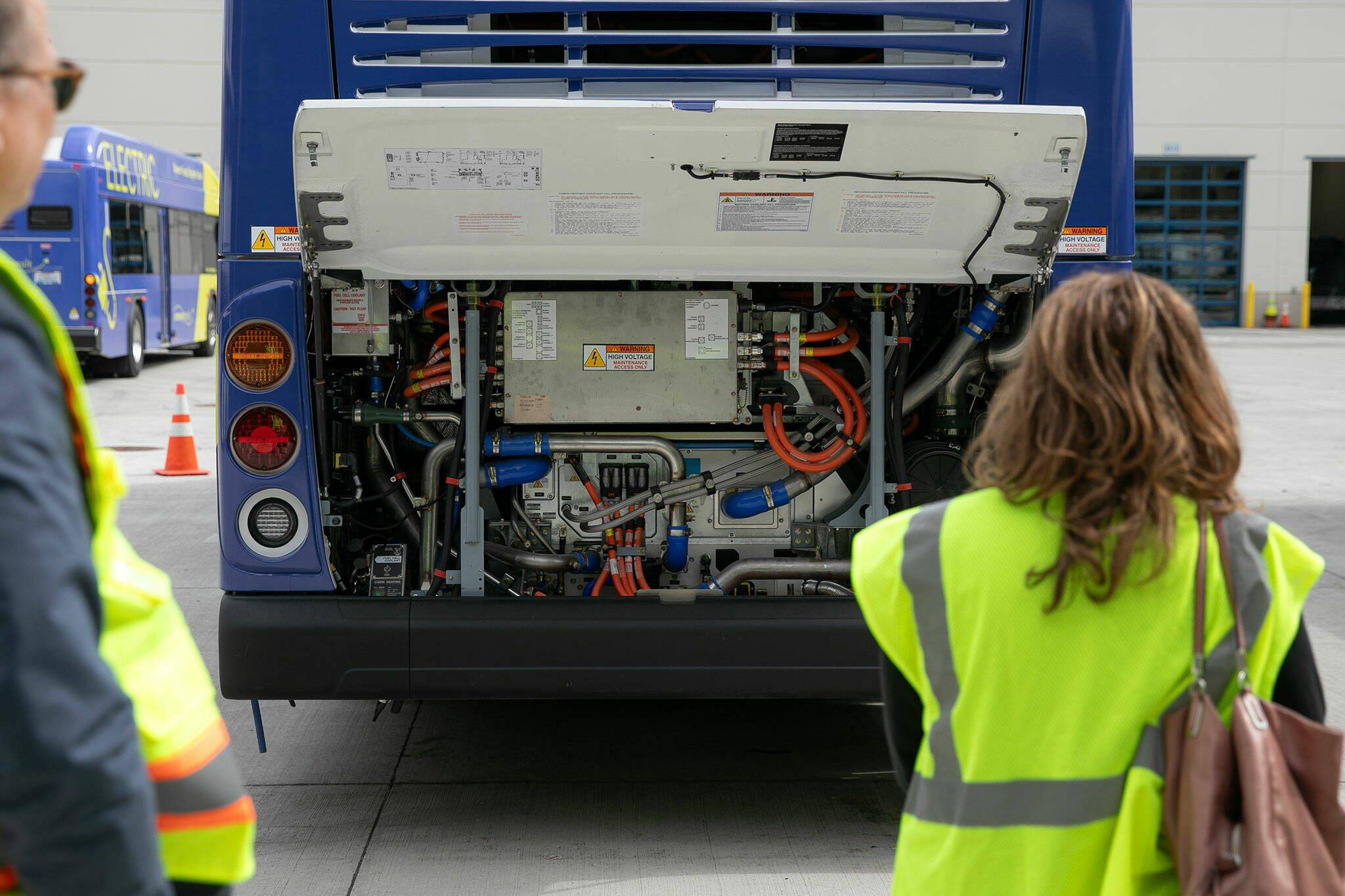Buses that run on the most abundant element in the universe may be traveling the roads of Island County in the not-so-distant future.
Island Transit got word this week that it will receive a $14.96 million federal grant to purchase 12 hydrogen fuel cell buses and the necessary fueling infrastructure. The project will support Island Transit’s commitment to moving toward a zero-emission fleet.
The buses safely harness the combustive power of hydrogen, a colorless, odorless and tasteless gas. Hydrogen fuel cells run hydrogen through a catalyst that produces energy to power a small battery that drives the vehicle. Hydrogen-powered buses have many advantages over diesel or plug-in electric alternatives since they emit only water vapor, can travel up to 300 miles and are fueled in a remarkably short amount of time.
Yet transit officials admit that the greatest impediment toward the move to hydrogen is the lack of availability of the gas in the Pacific Northwest, although that may be changing.
U.S. Rep. Rick Larsen, along with senators Maria Cantwell and Patty Murray, announced this week that six Washington state agencies will receive more than $47 million from the Department of Transportation’s Federal Transit Administration grant programs, which are funded through the Bipartisan Infrastructure Law. The money will be used to purchase both hydrogen fuel cell and battery election buses.
“Thanks to the Bipartisan Infrastructure Law, Island Transit has the funding it needs to purchase clean buses and fueling infrastructure for its fleet, enabling more people to get to and from jobs, school, the store and recreation opportunities in Island County,” said Larsen, the lead Democrat on the House Transportation & Infrastructure Committee.
Craig Cyr, the acting director of Island Transit, was excited about the news. As the city of Langley’s representative on the Island Transit Board, he’s been a vocal supporter of the transition to a greener fleet.
“Island County looks forward to the day when the only emission coming out of our bus tailpipes is water vapor,” he said.
Earlier this year, Community Transit in Snohomish County purchased a $1.3 million hydrogen bus and a $1.1 million electric bus under a pilot project to test the options for zero-emission buses, according to the Everett Herald. The hydrogen bus was the first in the Puget Sound region.
As Cyr pointed out, the lack of hydrogen fueling infrastructure is the greatest challenge to the technology. Community Transit currently has to truck the hydrogen fuel cells in from California, which he said is not sustainable and wouldn’t make sense for Island Transit.
The good news, he said, is that hydrogen-making facilities are planned for Lewis County and possibly Whatcom County. The Lewis County project is one of seven regional “clean hydrogen” hubs in the nation; the Pacific Northwest Hydrogen Hub, the “PNW H2,” will receive up to $1 billion in federal funding, according to the U.S. Department of Energy.
“This grant represents a transformative opportunity for Island Transit,” Cyr said. “We are pleased to be at the forefront of adopting hydrogen fuel cell technology, which plays a crucial role in our strategy to transition to a zero-emission fleet. This initiative underscores our commitment to environmental stewardship and demonstrates our dedication to building a greener and more sustainable future for public transportation.”
Not everyone is convinced.
“I’m confused as to why we keep purchasing buses that we don’t have the infrastructure to support,” said Island County Commissioner Jill Johnson, who is also on the Island Transit board. “As an organization it seems like we should be spending less energy on pursuing these types of grants and purchases and place more emphasis on reestablishing our structural leadership and stabilizing our workforce and routes.”
Others have questioned whether hydrogen is really environmentally-friendly since it requires energy to produce it; hydrogen is produced from water by electrolysis. This concern is why the Biden Administration supports the $7 billion project to create “green hydrogen” hubs where the fuel can be produced with carbon-neutral energy from wind, solar, captured methane or nuclear power.
Because of the unresolved questions, Cyr said Island Transit won’t jump into quickly purchasing hydrogen cell buses.
“We can’t buy the buses until we are confident in the supply of the fuel,” he said.



